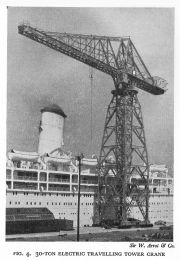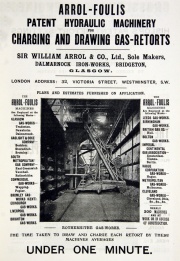William Arrol and Co






of Dalmarnock Ironworks, Preston Street, Bridgeton, Glasgow
of Parkhead Works (cranes)
Sir William Arrol and Co makers of cranes, and bridge builders.
1868 Company established by William Arrol, a jobbing blacksmith and boiler maker, in a small workshop in Bridgeton.
1870-1 established the Dalmarnock Iron Works to take advantage of the growing opportunities in bridge building.
Among his first important works was the iron bridge for the Caledonian Railway to carry it over the Clyde at Bothwell where he put into practice his idea of building the structure on land and then rolling it out, span by span, over the water.
This job was followed by construction of the bridge for the Caledonian Railway's Central Station over the Clyde at Broomielaw, the long viaduct over the South Esk at Montrose, and the bridge crossing the Paraguassu River at Bahia.[4]
1881 William Henry Barlow designed the replacement Tay Bridge; this was a double-track bridge 59 ft upstream of, and parallel to, the original bridge; it was built by William Arrol and Co/
1883-1890 Erected the Forth Bridge[5]
1889 Arrol and Pringle's valve gear.[6]
Constructed the Tower Bridge, London
1893 Public company. The company was registered on 2 January, to acquire the business of engineers and contractors, established by William Arrol.[7]
1900 Illustrations and descriptions of the works at Dalmarnock. [8]
1900 Converted into a limited company.[9]
Many improvements were introduced by him into the manufacture of gas.
William Foulis in conjunction with Sir William Arrol constructed the Arrol-Foulis machine, worked by hydraulic power, for charging and drawing retorts, the water also being used to cool the shovel of the charger and the rake of the drawer.
c.1910 Constructed the Middlesbrough Transporter Bridge
c.1910 Acquired Appleby Crane and Transporter Co[10]
Supplied a 35 ton steam travelling rail crane to the War Office, prior to 1914. It was at Shoeburyness School of Gunnery in late 1914, and last recorded there in 1927. The machine was in some respects not disimilar to a railway breakdown crane, but was well out of gauge for use on British railways. It had 9 ins. x 12 ins. cylinders, arranged horizontally, the entire machinery being carried low down in the side frames. A light lift was provided and the control levers were grouped in a frame situated near the jib foot. The carriage had five axles and it was specified to negotiate curves of 300 feet radius. The superstructure was supported by live race and short king pin thus representing the new concept in design. (see image on right)[11]
1914 Engineers, Bridge Builders and Contractors. Builders of the Forth Bridge, the present Tay Bridge and Tower Bridge. Specialities: Bridges, structural steel work of all kinds, hydraulic machinery, cranes and transporters, Arrol's Patent hydraulic riveting machines, Foulis drawing and Arrol-Foulis charging machines, Hunter Barnet dischargers for gas works. Employees 1,500. [12]
1915 Constructed the Warrington Transporter Bridge
1923 William H. Hutchinson joined the board of the company, looking after the general contracting side of the business.[13]
1925 Hubert E. Mayhew was appointed as sole agent in the London District.[14]
1926 Received an order for twenty-one "Arrol-Whitaker" electric power navvies for excavatin work. It is believed that this is the largest single order ever placed for electric shovels.[15]
1926 Received from the Crown Agents for the colonies an order for a 50-ton steam floating crane for use in the port of Lagos.[16]
1927 See Aberconway Chapter XV for information on the company and its history.
1927 - April. Rumours were started that the works of Sir William Arrol and Co at King's Dock, Swansea, which had recently closed down on account of the bad state of the steel trade, were likely to be acquired by A. D. Dawnay and Sons, of Battersea and Cardiff [17]
1961 Bridge builders, crane makers and structural and mechanical engineers. 2,150 employees. [18]
1968 Supplied container-handling cranes to British Rail Freightliner. [19]
See Also
Sources of Information
- ↑ Oxford Junior Encyclopaedia. Volume VIII. Engineering. Oxford University Press, 1955.
- ↑ Oxford Junior Encyclopaedia. Volume VIII. Engineering. Oxford University Press, 1955.
- ↑ Oxford Junior Encyclopaedia. Volume VIII. Engineering. Oxford University Press, 1955.
- ↑ The Engineer 1900/05/18
- ↑ The Engineer of 25th May 1900 p551
- ↑ The Engineer of 11th Jan 1889 p47
- ↑ The Stock Exchange Year Book 1908
- ↑ The Engineer of 18th May 1900 p506
- ↑ The Engineer 1900/05/18, p 527.
- ↑ The Times, Aug 02, 1911
- ↑ Guns and Gunners at Shoeburyness: The Experimental Establishment and Garrison by Tony Hill (ISBN: 9780860236603)
- ↑ 1914 Whitakers Red Book
- ↑ The Engineer 1923/01/19
- ↑ The Engineer 1925/10/02
- ↑ The Engineer 1926/07/12
- ↑ The Engineer 1926/07/30
- ↑ The Engineer 1927/04/15
- ↑ 1961 Dun and Bradstreet KBE
- ↑ The Engineer of 25th October 1968 p622






































